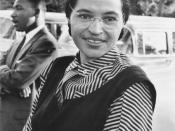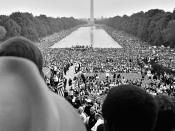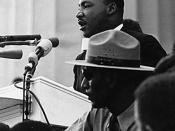Starting with the Free Speech Movement in 1964, college and university students massed in numbers to speak about their rights and what they wanted to see done in the world. The civil rights movement founded by Martin Luther King Jr., wanted peaceful protests, but on the day of King's assassination, the biggest riot happed in the capital of the United States, Washington, D.C. Between the civil rights movement and the anti-Vietnam protests, the only people that were stuck dealing with the issues were the police whether they liked it or not.
Some black leaders used the officers as "... scapegoats for American racial injustice." (Johnson, H. & Wolfe, N., 2003) Society accepted that students were going to voice their opposition regarding the war but when state or local police would show up to help keep the protest under control, it usually turned ugly. This forced the public's eye on the methods of officers and how management handled these situations as a whole, thus creating the subculture of police officers.
I would not have wanted to be an officer, a college student, or an African American back in those times.
Since officers are forced to wear many hats as they did back then too, it was seen that they should have been the pillar of our communities when they were not in uniform. This sometimes was not the case and forced police families to only be around other police families. Since the introduction of police cars, the usual officer who walked the beat was no longer familiar with the area, and this made people feel that they were no longer trusted and that the police had truly no idea of what was happening in the community.
According to our text, "National Guard troops were less effective, but still superior to...


